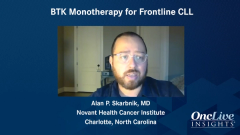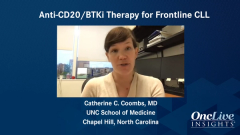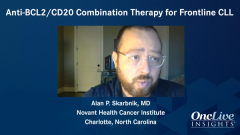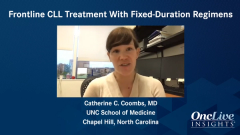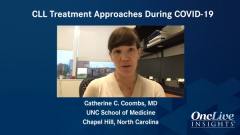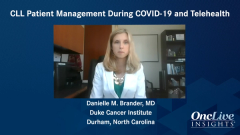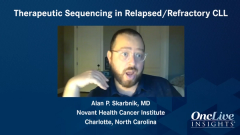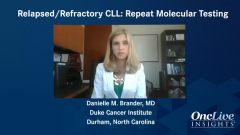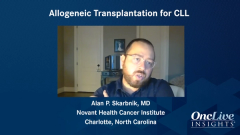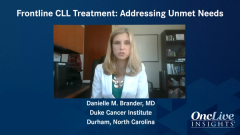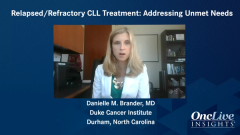
Relapsed/Refractory CLL: Repeat Molecular Testing
Episodes in this series

Danielle M. Brander, MD: In terms of the relapsed and refractory setting one question might be, what is the importance of the traditional prognostic markers in CLL [chronic lymphocytic leukemia] in the relapsed/refractory setting if you just said in that setting, you’re going to want to choose a novel agent over chemotherapy anyway? The reason we do those tests for those patients, such as repeating FISH [fluorescence in situ hybridization], repeating chromosomes, and repeating TP53 mutation status, is to identify how high risk those patients are to respond to that novel agent and remain in response and not develop resistance.
There are several studies now identifying that in the relapsed/refractory setting, patients’ risk of developing resistance to BTK [Bruton tyrosine kinase] inhibitors such as ibrutinib, acalabrutinib, or to venetoclax is much higher if they carry the high-risk TP53 aberrations. Knowing that ahead of time, you might still elect to start them on that novel agent, but it might change how you think of sequencing them down the road or being prepared for what happens after you get a response to that novel agent. We need to be thinking about that ahead of time; that’s for standard therapies that are available. The other reason to identify those patients is if they’re high risk for resistance before you start the novel agent, knowing that may lead us to have clinical trials for these patients and be able to offer clinical trials and improve long-term outcomes.
Andrew P. Skarbnik, MD: Cytogenetics is important at any line of therapy in CLL. What we’re looking at mostly in the second-line setting is if patients have complex cytogenetics, 17p deletion, TP53 mutation—11q deletion, not as much anymore. It depends on what they’ve received before, but certainly, 17p, TP53 disruptions, and cytogenetics will be the most important.
IgG mutation in the second-line setting matters less. You’re not going to give chemotherapy to this patient. Venetoclax and BTKi [BTK inhibitor] work in an IgG unmutated population. I would expect them to have been checked in the frontline setting. In terms of prognostication if they haven’t been checked, I check in the second-line setting so we know what we’re dealing with, but that doesn’t impact as much as therapy choices. We are looking for 17p deletion, TP53 mutation, complex cytogenetics, what prior therapy they received, how long they were on that, and if they had a response or not. If patients do progress on a BTK inhibitor, I do test for the TP53 mutation that leads to resistance of medication so that we know what we’re dealing with and what was the mechanism of progression there.
I am more concerned with the patients who progressed on those medications who don’t carry a mutation. It’s the biology of the disease, you should go with a different dose. The patients are more concerned about not responding as well to venetoclax. Whereas patients who do develop a mutation that is secondary to selective...from the BTK inhibitor itself, then those are the patients I expect to have the standard response to venetoclax because the mechanism of resistance is specific to a BTKi, at that point.
Catherine C. Coombs, MD: I do molecular testing at every subsequent line of therapy in addition to at the time of the patients’ first therapy. TP53 mutations, in particular, are known to be high-risk markers. For a young patient who is very fit, I consider referring them to an allogenic stem cell transplant, not at the beginning of their therapy, but once they have been progressed on and been failed by a number of novel agents. These patients should meet with a transplant doctor to discuss the risk/benefits of that procedure. I do think it’s important to check that test again with subsequent lines of therapy for patients who aren’t already known to have the mutations because those can be acquired with time and with years of therapy. We know those patients do not have long-lasting responses to any of our existing therapies, and so they may benefit from transplantation, provided they are an appropriate medical candidate.
Transcript Edited for Clarity


